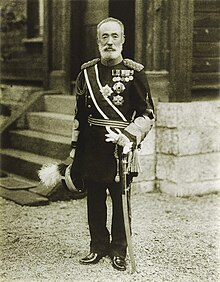Maresuke Nogi
| Count Nogi Maresuke | |
|---|---|

Count Nogi Maresuke standing before his house in Nogizaka, Tokyo
|
|
| Nickname(s) | Kiten Count Nogi |
| Born |
25 December 1849 Edo, Japan |
| Died | 13 September 1912 (aged 62) Tokyo, Japan |
| Allegiance |
|
| Service/branch |
|
| Years of service | 1871–1908 |
| Rank | General |
| Battles/wars | |
| Awards |
|
Count Nogi Maresuke (乃木 希典?), also known as Kiten, Count Nogi (25 December 1849 – 13 September 1912), was a general in the Imperial Japanese Army and a governor of Taiwan. He was one of the commanders during the 1894 capture of Port Arthur from China. He was a prominent figure in the Russo-Japanese War of 1904–05, as commander of the forces which captured Port Arthur from the Russians.
He was a national hero in Imperial Japan as a model of feudal loyalty and self-sacrifice, ultimately to the point of suicide. In the Satsuma Rebellion, he lost a banner of the emperor in battle, for which he tried to atone with suicidal bravery in order to recapture it, until ordered to stop. In the Russo-Japanese War, he captured Port Arthur but he felt that he had lost too many of his soldiers, so requested permission to commit suicide, which the emperor refused. These two events, as well as his desire not to outlive his master (junshi), motivated his suicide on the day of the funeral of the Emperor Meiji. His example revitalized the Japanese tradition of ritual suicide.
Nogi was born as the son of a samurai at the Edo residence (present day Tokyo), of the Chōfu clan from Chōshū (present day Yamaguchi Prefecture). He was born on 11 November 1849, according to the old Japanese lunar calendar, or Christmas day, according to the new one. His childhood name was Mujin, literally "no one", to prevent evil spirits from coming to harm him. On turning 18, he was renamed Nogi Bunzō.
...
Wikipedia
